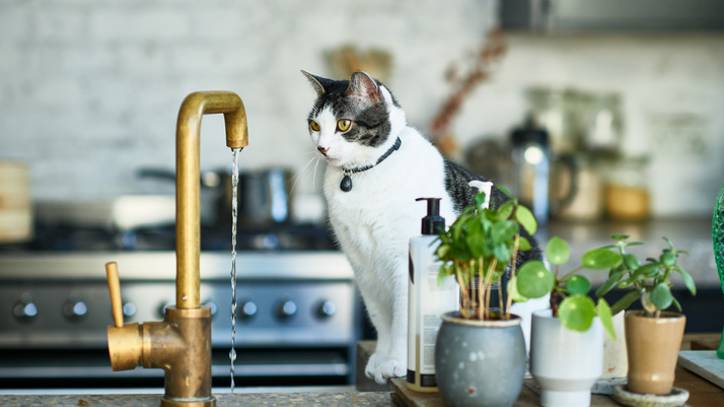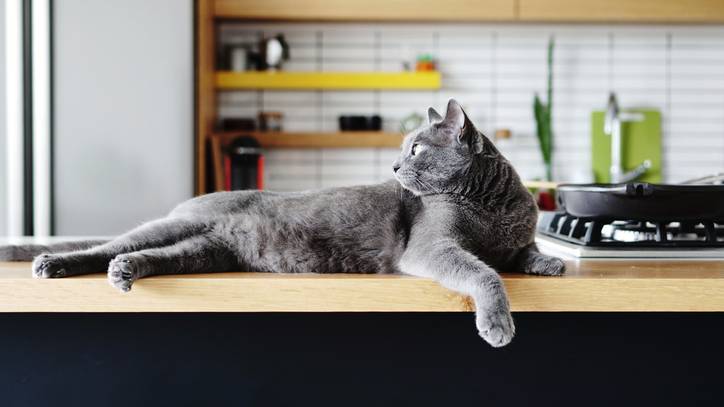How to keep cats off counters and tables
Do you need to know how to keep cats off counters? This guide has you covered

If your feline friend is constantly jumping up on the kitchen worktop to drink from the faucet or snaffle snacks from the sideboard and you’re wondering how to keep cats off counters or your brand new coffee table, read on.
It can be frustrating if your cat loves counter-surfing. You may be worried about sanitation if it’s where you’re preparing meals, that they’ll get in your way or knock something over and break it.
However, the real danger is to themselves with knives and other sharp utensils around. You may want to know how to discipline your cat when they're misbehaving but your furkid won’t know why you’re shouting or punishing them. Instead learn how to change their behavior.
Below you’ll find all the advice you need to understand why cats like high places and how to stop them from jumping up and keep your counter clean and cat free.
- Why your cat is stealing food and how to stop him
- Best cat treats: Spoil your kitty with a healthy snack
Why do cats jump on counters and tables?
Your cat could be jumping up on counters and tables for a number of reasons. Here are just a few:
Instinct
Cats are descended from wild animals so often their behavior is them following their natural instincts to hunt. When your cat jumps up on the kitchen counter they are mimicking wild behaviors. In the wild, cats climb trees and higher ground not only for safety, but so they have a better vantage point to seek out prey, whether that’s a bird out of reach from below or a rodent they can surprise and pounce on from above.
In the home, they may feel safer on the kitchen counter or a table if there are other pets or children on the floor. From a height they can survey their environment, go in search of food (if you’ve left any out) and practise their hunting skills (jumping and stalking).
Get the best advice, tips and top tech for your beloved Pets
Temptation
Often jumping up on the counter or table is a reinforced behavior. They may have done it once and you rewarded them with a treat so they repeat the behavior in the hope of more treats. If there is food in the kitchen or dining room your cat is likely to be tempted.
Attention
If your cat is jumping up lots it may just be that they’re bored and want attention. If you’re in the kitchen they may just be trying to get closer to their human.
Curiosity
Cats are naturally curious and love to explore so they need lots of vertical space to keep them stimulated both mentally and physically.
Illness
While your cat may just prefer running water to the still water you’ve left out in a bowl on the ground for them, drinking from the faucet can indicate illness. Make sure if they seem more thirsty than usual that you check in with the vet as this could be a warning sign for diabetes or kidney malfunction.
For further reasons why your fur friend may be obsessed with the sight of water, be sure to read our article “why does my cat paw at their water bowl?”
How to keep cats off counters and tables
1. Cat trees
If your cat needs to practise their hunting skills or explore their environment through vertical spaces, give them other options. Cat trees are a great way to give your cat more vertical space, exercise and an enriched environment so they can use up their energy and stay entertained.
2. Alternative treats
If your cat is searching for treats in the kitchen try offering them tasty titbits elsewhere or in a more exciting format. Spoil your kitty with one of the best cat treats or make it more of a hunting game by putting kibble inside puzzle feeders around the house.
3. Clean up
Make sure you tidy away any food, don’t leave snacks or leftovers on tables or counters and wipe down surfaces so your cat isn’t sniffing around for treats.
4. Keep temptation away
If they are tempted by treats in the kitchen or dining room, try to keep temptation away. This could mean taking away their access to the counter or table if the only way they can jump up is by using a chair or other furniture. Or you may have to close off certain rooms to them while you cook or eat.
5. Give them attention
If your pet has enough interactive play they may not seek your attention when you’re cooking, eating or working at the table. Make sure they get lots of one-on-one time and that they have plenty of toys to play with when you’re not there.
6. Buy a water fountain
If your kitty is jumping up to drink water from the faucet, try replacing the water in their bowl more often. If this doesn’t work and your feline is one of the cat breeds that love water you may want to invest in a water fountain designed for pets so they have running water on the ground.
7. Odor-based deterrents
You may want to consider repellents to keep your cat away from counters and tabletops. However, it's important not to use deterrents that can harm or upset your cat.
Try keep your cat off the counter by using smells or scents that they don’t like and will avoid going near. This could be a non-toxic plant such as rosemary or lemon balm or an essential oil. Just make sure that whatever you use is safe and will not harm your pet.
8. Noise-based deterrents
Cats are not a fan of loud noises. Place aluminium cans filled with pennies, pots and pans or baking trays on your kitchen counters so when your cat jumps up on them the clatter of the falling objects will dissuade them from repeating the behavior.
9. Tactile deterrents
If you want your counter or table to be cat-free try placing down something your kitty won’t want to walk on such as sticky tape or a carpet runner or mat with the nubs facing upwards.

Does aluminium foil keep cats off counters and tables?
When you crinkle up aluminium (or when a cat jumps on to it) it emits a high-pitched sound that only a cat can hear, but this sound is enough to put the cat off stepping on it again.
It’s believed that cats don’t like how the foil feels under their feet or the sound it makes as it is too much for their senses so it acts as both a tactile and noise-based deterrent.
What cat-safe essential oils and sprays can keep cats off counters and tables?
Essential oils which are non-toxic and cat-safe include rosemary, basil, fennel, citronella and lemongrass oil.
However these should still always be diluted with about 20 drops of oil to ¾ cup of water and they should be rubbed into your countertops or better still put on to dish cloths hanging in the kitchen so that your cat can smell the scent but is not licking the surfaces or its paws and ingesting the oil.
How to train your cat to keep off counters and tables
If alternatives or repellents don’t work, try training your cat to stay off the counters and tables.
This can be done by using positive reinforcement. Every time they jump off a counter or table praise them, show them lots of attention and give them treats. When they jump up, don’t reward them or pay them attention and they will soon learn.
Clicker training can be particularly effective by using a command such as “get down”, using the clicker when they obey and then rewarding them with a treat so they associate getting down with the clicker and getting a reward.
When training your cat it’s important to understand why they’re behaving this way (do they want food or attention?), to plan how to deal with it and then to be consistent with your training. This means no slipping up and stroking them on the counter one day. You’ll also want to offer your cat alternatives and remove temptations to help with your training.
Clean all your countertops and tables, remove food and snacks and keep your pet in a different room if you’re cooking or eating to try and create boundaries to help them. Make sure they’re getting plenty of mental and physical enrichment. This means lots of interactive toys to play with and cat trees to jump and climb on.
What not to do
Avoid punishing or shouting at your cat as they won’t respond to this. And never use a deterrent that will harm them. Don’t spray them with water, use toxic sprays, cleaning products or essential oils.
If you spray your cat with water, push them off the counter or shout at them, this won’t stop their behavior; they are more likely to avoid you and jump on the counters when you’re not present.

